H. Nelson Tracey’s BREAKUP SEASON has a unique aura about it—there’s a dash of cynicism, certainly, but ultimately that energizes the film well, leading it to oftentimes feel less like modern holiday streaming fare and more like a proper family dramedy. The logline is simple enough: Ben (Chandler Riggs) brings his girlfriend Cassie (Samantha Isler) to his home in rural Oregon to introduce her to his family, only for her to break up with him a day into their trip and become stuck there for the remainder of the holidays. Tracey gets some tremendous performances out of his cast, notably rising comedy phenom Jacob Wysocki and longstanding character actor (and noted Twitter personality) James Urbaniak. There are traces of films like THE FAMILY STONE or Clea DuVall’s pandemic watch HAPPIEST SEASON, but functionally it is a movie about a breakup first and the holidays second. I chatted with Tracey about the film’s path to release, navigating the world of indie distribution, the impact Oregon and the Eastern Oregon Filmmaker Residency program had on it, and more!
The thing I appreciated most about BREAKUP SEASON is that the question of whether or not the breakup will stick throughout the movie is extremely engrossing until the credits roll. From both how it played out on the page when you wrote it to how that came together within the actual movie, how did that question evolve over time?
H. Nelson Tracey: I’d had the original premise in my head for over a decade. Guy brings girlfriend home for Christmas—they break up—but due to winter weather, now she’s stuck with his family. In that setup, the next phrase would normally be: hilarity ensues. And for a long time this movie only existed as a one-page document on my computer because I was pretty stumped by what to do next, and it seemed ripe for something formulaic. I lived some life, went through a breakup or two, and this idea kept coming back to me and people in my friend group would latch onto it and ask me about this specific screenplay. But the big a-ha came in early 2022: If I reframed this movie as a drama first, I could do this story justice. The breakups I’ve had were brutal. Same with those of my friends and siblings. If I was going to make a movie about it, I was going to tell it as real as possible. The movies that inspired me were not Christmas movies, but movies like TAKE THIS WALTZ, THE WORST PERSON IN THE WORLD, LADY BIRD, etc.
You can certainly feel some of the comedy-through-tragedy and youthful isolation of LADY BIRD throughout.
HNT: In the commentary for LADY BIRD, Greta Gerwig said she cast Saorise Ronan because she was a dramatic actress—and yes, the movie is a “comedy,” but high school is do-or-die high stakes and if they entered it as a drama first, comedy second, the audience would get the most out of it. And that was an essential evolution—this reframing as “drama first, comedy second,” which informed every decision that came next, from crew, to casting, to location. I didn’t set out to make a holiday movie. But the story I wanted to tell had to be Christmas, because that’s when the stakes are high and the weather is bad. That quickly became an unexpected advantage for the reason you’re asking me: People read the synopsis and they come in with a whole list of expectations for what this will be we can then subvert.
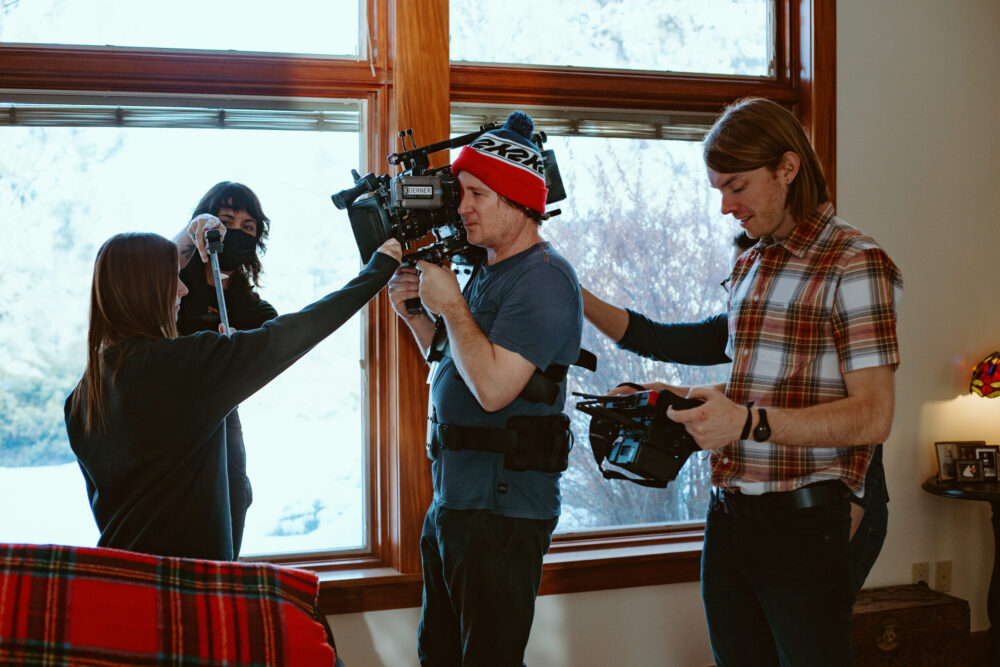
With that new framing, what were the tropes, either of the broader romance genre or especially the holiday film genre, that you knew you wanted to try and avoid for BREAKUP SEASON?
HNT: The holiday tropes were something that we could then toy with—the “will they-won’t they” question could be interesting because our history of holiday movies tells us one thing is going to happen, but the tone of the movie would lean in the other direction, so you get to enjoy the unknown of the outcome your first time watching the movie. One of the things I’m most happy with is that the final film can be enjoyed by people who love Christmas movies, as well as people who hate them. So back to that original question, I don’t think the final outcome ever drastically changed, but the tone and how I was going to handle it went through an essential metamorphosis that was vital to everything else in this movie happening.
What, historically, have holiday films or breakup films done well and what do they often miss the mark on?
HNT: When I watched THE FAMILY STONE, which is one of the few movies that you could call a “Christmas dramedy,” I found that the family dynamics are all over-the-top and it never felt realistic to me. We do a lot of similar things—an awkward arrival, a dinner disagreement, we even have a pretty Christmas Eve montage—but I would watch movies like that and aim for something more grounded, for dialogue that sounds like it could be your parents or siblings. There’s an early argument about being a vegetarian, and someone asked me why I didn’t make it more extreme—like a vegan versus a hunter—and that immediately felt hoaky to me, and over-the-top. I’ve only seen that stuff in broad comedies, but I’ve had the exact disagreement that happens in this movie in real life on multiple occasions, and I even wrestle internally with the hypocrisies of vegetarianism, so I could write a nuanced and realistic disagreement that sounded like something that would happen at my family dinner table (in a good way), where both sides are compelling.
As far as breakup movies go, they’re all about characters who are 30+ in age. THE BREAK UP, THE WORST PERSON IN THE WORLD, MARRIAGE STORY—these are all movies I took inspiration from, but none about that time in your early 20s when I found the most painful breakups to happen, that post-college funk where people are trying to land on their feet and do so in tandem with someone they met in college, and most don’t end well. That was the thing I saw as new territory to explore.
I know La Grande, Oregon played a huge role in the production of this film, and that you were in the Eastern Oregon Filmmaker Residency program, which the EOFF (Eastern Oregon Film Festival) launched a few years ago. Talk about the role it ultimately played in the film’s development.
HNT: I came to the Eastern Oregon Film Festival (EOFF) in October 2019 with a short documentary I had directed. I had no idea it would be a life-changing film festival. So I tell every filmmaker to go to those regional festivals. You just never know. Sometimes they’re duds, sometimes they do what this one did. The next year of EOFF was 2020 so it was virtual. During the Zoom filmmaker happy hour, festival director Christopher Jennings pitched starting a filmmaker residency to the group. What he didn’t know is that I had unsuccessfully been applying for artist-in-residence programs for years to a 0% success rate. So I was pretty persistent with it and was going to do whatever it took to be a participant in one of the only filmmaker-specific residency programs.
The following May of 2021 I became one of six filmmakers in the first cohort, and the program was geared specifically for filmmakers on the cusp of directing their first feature. So I spent a self-guided month writing screenplays and sharing drafts with the cohort, with the mission of completing a first draft of a new feature geared toward directing on an indie level. Ironically, the feature I spent the majority of the time writing was not BREAKUP SEASON, but the seeds were planted and I feel like I needed to knock out that “scratch draft” to get to where BREAKUP SEASON would be. A few scenes carried over into this final film: The train scene and the underground mall scene were both directly inspired by time at the residency and time bopping around La Grande that month. From a creative perspective, that experience was priceless and everything I had dreamed for out of an artist residency.
So how does that residency lead to the actual greenlight of BREAKUP SEASON?
HNT: Well, nobody is asking you to make your movie at the end of a filmmaking program, and there wasn’t any accountability. I could’ve easily had my fun writing and never done any more with it. But I was pretty committed to seeing the vision of the residency through, which meant not just spending a month there writing, but actually manifesting that into a feature film production, which was the real mission. The other essential ingredient is that Chris connected us to resources that the state of Oregon offered—it’s an incredibly indie film-friendly state and with the foundation of spending a month in La Grande, I saw a path towards production there that I’d never seen anywhere else: tax rebates, crew directories, filming locations, and a lot more resources than are available in a place like LA for non-established filmmakers. All the rest of the steps would need to come through a lot of work, but as someone who’d been chasing the elusive “first feature,” this quickly became the clearest path towards that goal. I’d had a few first feature dead ends—this clearly wasn’t one.
Chris and I have always aligned on this mantra of “throw dates on the calendar and march towards them.” He’s incredibly good at that. If you want to run a film festival without big backing in a small town, you have to have that mindset, because you’ll never start if you wait around for all your resources and finances to be in place. So I applied that mindset with this film in a major way.
Where was this in the timeline of the residency and you first meeting Christopher Jennings?
HNT: This was May of 2022, so a year after the residency. I’d wrapped up my last editing job for a while, and so the big choice to make was: try and shoot this movie the following February—it had to be February for the snow—or kick it a whole year. The idea of waiting nearly two years to direct a project seems unfathomable, so that May I got started with just a tiny bit of momentum from the residency and from the Oregon state support. I had firm dates and I’d figure it out with the mindset that had fueled Chris producing the festival and the residency year in and year out.
So ultimately what were the benefits of that program, and the benefits of filmmaker residency programs broadly?
HNT: I don’t think it’s necessarily about a residency being the ticket to success, but it certainly gave me the creative time I needed to develop this idea, and then a sense of credibility that the project was backed by a film festival. And because it was a new program, I still had the freedom to figure out what that looked like, and develop it however I saw fit. I think that’s the big takeaway, is looking for programs where you can be at the start of something exciting, because it’s much easier to get in the door in a new program than an established entity. I definitely felt shut out of programs like Sundance Labs. With this one, I was part of the building process and that allowed me to be part of something exciting and be a welcome part of the process. I love these programs and will continue to seek them out, but I encourage filmmakers to look not just at applying to established competitions and residency programs, but see if you can find anything new or developing so you can more quickly find a way to get involved, as I was fortunate to have done here.
Now that the film has landed on VOD and you’ve had an opportunity as a filmmaker to navigate both a theatrical rollout and an online release, what thoughts have you gleaned, if any, about modern indie distribution?
HNT: I could write a book about this question and if someone offered me an advance I happily would! I think the biggest misinformation that most indie filmmakers suffer from is this expectation that the distributor is your golden ticket to success. This is because the distributors we’re all aiming for as young filmmakers—be it Netflix, Hulu, A24, or Neon—are not only getting movies out there, but are incredibly well-oiled marketing machines. The reality is, if you’re a true indie film like ours, those distributors will not touch you. They’re too busy with their own incubated movies to care about an indie at a regional festival. And the distributors in the minor leagues, where we are, are not going to do everything (or maybe even anything) for you surrounding the marketing effort. If you want your movie to be a success, it has to be on your terms.
It was Buffalo 8 that ended up acquiring you, right?
HNT: Correct. We were incredibly grateful, and the big thing they offered was they were going to help us ensure it’d be available by Christmas—which was vital. It was clear that they were going to be the ones to get us on to all the platforms we wanted to be on (Amazon, Apple TV, etc), however, if anyone was going to actually sit and watch this movie, we had to treat this like we did at film festivals and do our own marketing push, because it’s our baby and we want to see it fly, and we were going to work harder than anyone to do this. So my takeaway is that distribution is the vessel to get the movie out there, but at the level we’re working at, you are still the chief marketer and the success of the movie relies on you spreading the word.
The best way to practice this is still film festivals. That’s the thing: Film festivals were never our ticket to distribution, but they were vital to our marketing efforts and I spent months on the circuit essentially snowballing my way towards a November theatrical release and a December VOD release. And I needed all that practice, so by the time these big events came, I’d been in marketing mode for nearly a year. I wish I could say that making an indie movie ends when you finish making it, but it really is closer to the halfway point. And if you want your movie to have a shelf life, you have to be the one to drum up interest and excitement, with the help of your team. That was a vital thing to know going in—I didn’t realize just how important this was.
The plight of the modern day artist, really.
HNT: Yeah, on the one hand, it has never been easier to get a movie available to watch anywhere in the USA. You can put your movie on Amazon yourself if you really want (it requires a few steps but is pretty attainable). But then the downside is, think about the glut of options that exist and how many other thousands—yes, thousands—of indie filmmakers are doing the exact same thing. So how do you distinguish your project? That’s where you have to roll up your sleeves and do whatever you can to get people to care about your movie. And learning how to get people interested in your film has been my ongoing project for the better part of three years, from early script stages to being a click away.
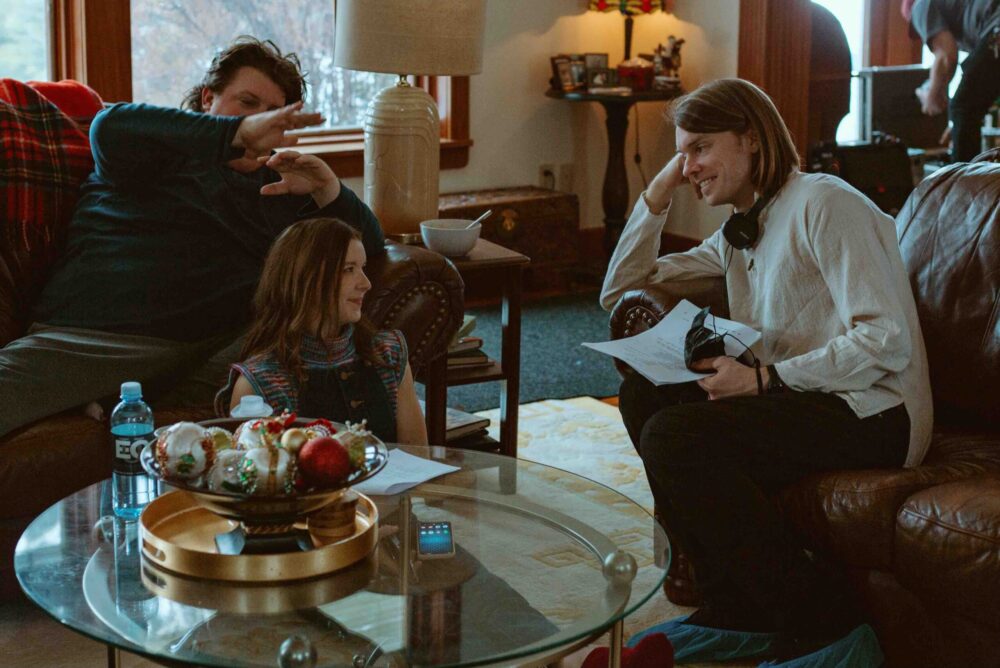
What has the experience of seeing the movie slowly roll out actually been like in the age of social media and Letterboxd—a “click away,” as you say? Watching a piece of art find an audience over a full year must bring with it many observations.
HNT: I completely underestimated how cool it would be now that it’s out there. It first felt like a huge relief. But to your point, there’s a lot to glean from the internet upon release. Because we don’t get numbers from our distributor until early 2025, I am relying on things like trailer views and Letterboxd logs for some semblance of how many people have actually seen the movie in the short term. I’ve always been into the numbers and metrics—I’ve been using IMDb since I was 12 to rate movies, so when Letterboxd came out it was like heroin for me at first. I’ve now tapered out, but I still use it to log movies—so yeah, you better believe I read those online reviews!
Has that reaction met what you thought would happen?
HNT: We’ve really exceeded what I thought would happen in terms of number of ratings and reviews at least, which feels like the reward for a huge, grassroots marketing push from all involved. It’s been really cool to see honest feedback—I don’t mind the negative reviews at all and naturally most fall somewhere in the middle. Even some of the negative feedback is stuff I grappled with in the script. For example, we have a long first act—we always did—so when people complain about that, I’m super aware of it, but I needed to lay the groundwork for the breakup and that was the way to do it. The other best part is people from random corners of my life reaching out that they’ve seen it. When you’re doing festivals/theatrical, you have a pretty good sense of who’s coming, but I’ve loved the surprise appearances from old friends in various cities, and that feeling is exponentially larger now that it’s online. I reconnected with a high school classmate I hadn’t talked to in ages who emailed me saying how much he enjoyed the movie. I’ve loved both total strangers and old friends letting me know what they think about it. I haven’t said much about regular social media, but yes, ultimately Instagram is the most vital tool a filmmaker has to market a movie these days, and TikTok helps too. I’m so happy the movie “exists” now, meaning anyone can watch it anywhere, there’s no barrier to entry. It’s been a long time coming and wonderful to reach this point.
Are you at all exhausted after these three years? Is it tiring seeing the final product?
HNT: Well, for most of the festival run I sat in every screening. I never grew tired of sitting with the movie in an audience—especially since it’s a movie that, without fail, elicits reactions. I’ve seen the movie with four people and I’ve seen it with 400 people—I love both experiences. I loved reading the room and the minute differences from one city to another. That’s a total rush. Thankfully, by the end, I felt like I’d gotten more than my fair share of that theatrical experience. I didn’t neglect that experience and I think every filmmaker should get to savor that the way I certainly did. I’m really proud of the movie and the process we went through to make it. As a first-time effort, I feel like I left it all on the field. We all learned so much and grew as people, and I’m really elated at what it’s done for not just me, but for all the players involved. Not to mention all the new, rich relationships that have come from it with producers, cast, crew, and festival folks who are now friends.
And now that the theatrical rollout is officially done and it’s on VOD now, where does the film exist in your mind?
HNT: I’m still coming back to earth from it all as it’s been nearly three years of my life coming to a close. I still have a few loose ends to tie up, but early 2025 is definitely a reflecting moment for me as I decide where to thrust my energy next. I have a part-time gig that’s going to allow me to stay afloat and decide what to do next, which is perfect.
I’ll say this: Obviously this is a personal film and drawn from a lot of real-life inspiration even though it’s fiction. But it was written by me three years ago, and that person is so different now. So the screenplay itself is like, this wild time capsule of me circa early 2022 and what I was grappling with then, and pouring experiences prior into that moment. And that’s how any movie is—it feels like you’re time-traveling, because by the time audiences see your movie, it has to be from ideas you had at least two years prior in most cases. Yet it’s brand new to audiences and they’re still getting the rush I got from the first time seeing it. It will always be a huge part of my life and there’s nothing like your first, but if this movie does what I hope it to do, it will serve as a foundation for the type of filmmaker I hope to be. I can’t quantify how much I’ve learned and it is all very applicable to directing another movie. I knew I needed to conserve energy: It’s so easy to get burned out on this. I feel like I made it to the finish line largely unscathed, which is a blessing. And soon, after a few more Instagram posts, it’ll become time to hibernate for a little while and emerge with the next one.


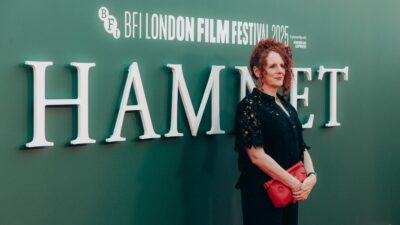
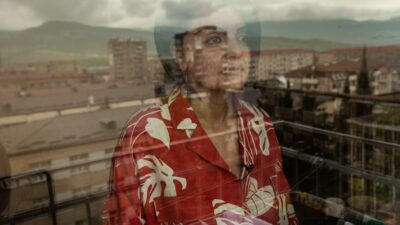

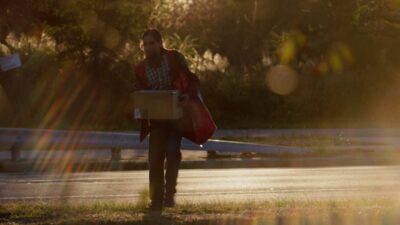


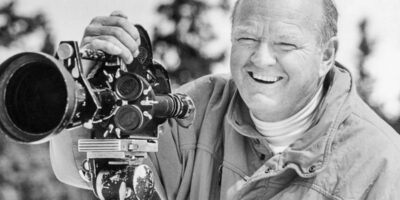
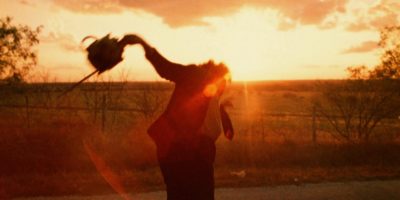





Comments